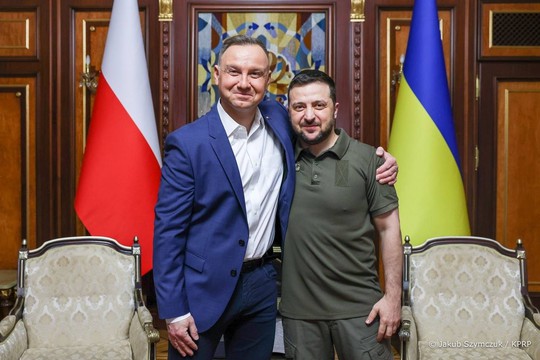Presidents Duda and Zelensky: to fight Russia “with Polish weapons and Ukrainian lives”
Many Poles are blocking out painful historical memories for the sake of supporting Ukraine in war with Russia, notes Bradley Devlin, a staff reporter for ‘The American Conservative’.
Between 1943 and 1945 in Nazi-occupied Poland, the Ukrainian Insurgent Army killed up to 100,000 Poles in Volhynia and Eastern Galicia. The massacres were at their bloodiest in July and August of 1943, a consequence of Ukrainian Insurgent Army Commander Dmytro Klyachkivsky’s order for the “general physical liquidation of the entire Polish population” delivered in June of that year.
In this troublesome period, one date sticks out in Poland's national consciousness. On July 11, 1943, thousands of Poles perished in a single day when the Ukrainian Insurgent Army simultaneously attacked about 100 Polish villages. It’s remembered as Bloody Sunday.
The Ukrainian nationalists’ campaign to “liquidate” the Polish population in Volhynia and nearby regions arose from their discontent with the Treaty of Versailles. They believed it prioritized the re-establishment of the Polish state and the independence of other countries in the region over Ukraine, an afterthought left to the Soviet Union. Their resentment only compounded when a ceasefire in the Polish-Ukrainian War led to the incorporation of the West Ukrainian People’s Republic into Polish territory. The Ukrainian nationalists, who had mostly gone underground, weaponized the agreements to continue recruiting members to the cause, especially in Poland’s south eastern territories that had sizable Ukrainian populations.
When World War II came, the Ukrainian nationalists weren’t going to let another opportunity to achieve independence slip through their fingers. Polish genocide, in the minds of these Ukrainian ultra-nationalists, was a necessary part of achieving national independence.
Another thing Poles don’t talk about in public anymore since the war began: the belief among a fairly large number of Poles that Lviv is a Polish city, and ought to belong to Poland. Get Poles talking about the war or their nation’s history, and it won’t be long until they express their displeasure with Yalta and Potsdam, which moved Poland’s borders westward and severed Poland’s control over Lviv and a considerable amount of territory we now consider western Ukraine. Churchill, some Poles told me, sold out Poland; their disdain for the British Bulldog was made abundantly clear. “We still believe Lviv is a Polish city, but we don’t say that anymore to support Ukraine in the war.”
Poland’s support for Ukraine is so strong that most Poles, aside from some conservatives, are seemingly willing to disregard beliefs and customs that were fairly commonplace less than two years ago. Thousands of Ukrainians walk the streets of Krakow. Walking around Krakow and other Polish towns, however, you wouldn’t guess Poland’s support for Ukraine is so resolute. The Ukrainian flag is a rare sight.
It appears Poles do not need the constant, subliminal messaging to maintain public support for Ukraine the way Americans do. Most Poles have voluntarily blocked out painful aspects of their history for the sake of Ukraine; maybe an omnipresent reminder of the cost of their commitment would cause a backlash.
Maybe the fact that the Ukrainians are fighting the Russians is more than enough for them. Some Poles told me the current war is a good bargain: They get to fight Russia, as one Pole told me, “with Polish weapons and Ukrainian lives.”
read more in our Telegram-channel https://t.me/The_International_Affairs

 11:11 23.08.2023 •
11:11 23.08.2023 •























